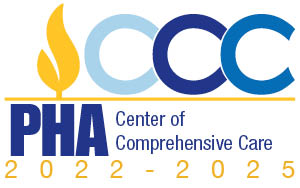 Pulmonary arterial hypertension (PAH), once rapidly fatal, can now be managed with medication. The UNC Pulmonary Hypertension Program is equipped with experts who are providing that life changing care through diagnosis, treatment and research. It was the first Pulmonary Hypertension Association (PHA) Accredited Comprehensive Care Center in North Carolina and is still one of only two in the state. After thorough review, the program has been reaccredited until November of 2025.
Pulmonary arterial hypertension (PAH), once rapidly fatal, can now be managed with medication. The UNC Pulmonary Hypertension Program is equipped with experts who are providing that life changing care through diagnosis, treatment and research. It was the first Pulmonary Hypertension Association (PHA) Accredited Comprehensive Care Center in North Carolina and is still one of only two in the state. After thorough review, the program has been reaccredited until November of 2025.
“We are delighted to receive another three-year cycle of accreditation. This designation reflects the continued efforts of our team members, including providers, nurse coordinators, pharmacists and research coordinators. This also helps patients throughout the region know where they can receive cutting edge clinical care and research opportunities.” H. James Ford, MD, director of the UNC Pulmonary Hypertension program said.
The program, which has its home in the Division of Pulmonary and Critical Care Medicine, has been accredited since 2015. The program collaborates closely with members of the Division of Cardiology. Team members also include pulmonologists Barbara LeVarge, MD (associate program director), Mazen Al-Qadi, MD, and cardiologist Lisa Rose-Jones, MD. Nurse coordinators Laura Nowicki, RN, and Sara Decker, RN, provide vital care coordination services to the program’s patients as well. Paula Glover and Kaitlyn Quigley work to coordinate the program’s research efforts. “Caring for pulmonary hypertension patients is complex, and it is certainly a team effort. We are fortunate to have a great group that is dedicated to our patients” adds Dr. Ford. Indeed, having all of these team members in place is one of the crucial components needed to achieve and maintain accreditation.
The field of pulmonary hypertension continues to grow and new therapies are actively being investigated, with a high likelihood that further new drugs will be approved in the near future. The mission of the UNC PH program is to provide patients with comprehensive and robust diagnostic assessment, access to all available therapies as indicated, opportunities for clinical research and a strong patient support network. The program also participates in the PHA registry entitled PHAR, which is a multicenter prospective registry that collects information on patient diagnosis, treatments, and outcomes from participating accredited centers. This data allows for a richer understanding of how patients with PAH do in response to treatments they receive, and other factors related to their care.
The UNC PH program looks forward to continuing to be a nationally recognized center of excellence that comprehensively serves patients in the region and helps to advance the field.